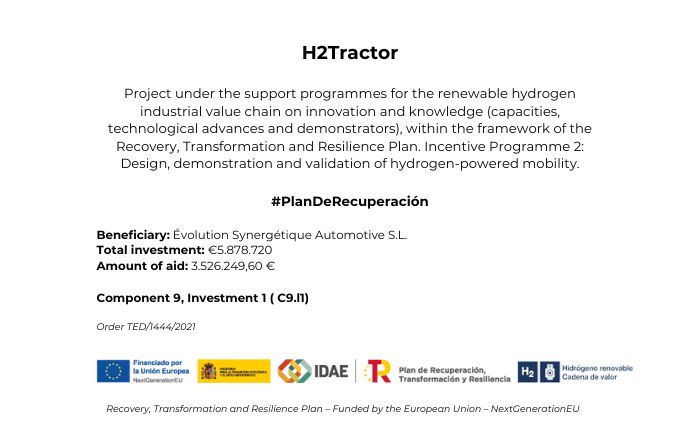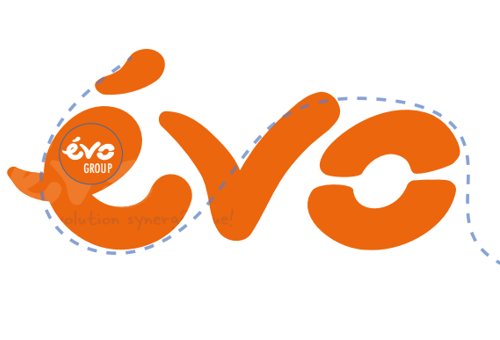Évolution Synergétique Automotive S.L. (ÉVO) has launched the H2TRACTOR project, with the aim of developing an electric industrial vehicle powered by hydrogen fuel cell (FCEV) for logistics use in port, airport and logistics centre environments. This innovative project has been made possible thanks to a major grant obtained under the support programmes for the renewable hydrogen industrial value chain on innovation and knowledge (capacities, technological advances and demonstrators), within the framework of the Recovery, Transformation and Resilience Plan, Incentive Programme2: Desing, demonstration and validation of hydrogen-powered mobility, with 3.5 million euros in non-refundable. The final resolution of the subsidy was communicated by the IDAE on 5 April, and the project will have a duration of 36 months.

Recovery, Transformation and Resilience Plan – Funded by the European Union – NextGenerationEU
The H2Tractor project aims to carry out research, design, development, innovation, demonstration and validation of a heavy goods ground vehicle in logistics environments, focusing on operability, maintainability, reliability, connectivity and safety. The project manager, Rafael Girón, responsible for the overall coordination of the project has already started working on the organisation of the team, made up of 40 EVO engineers and transversal staff, who will develop the 10 work packages defined to complete this ambitious project and achieve a fully operational prototype that not only meets the highest standards of safety and efficiency, but also actively contributes to the decarbonisation of port areas. The innovative approach of this heavy-duty vehicle lies in its propulsion system, which will use sustainable hydrogen instead of conventional fossil fuels. The green hydrogen, produced from renewable energy sources, will be used to generate electricity through a hydrogen fuel cell (FCEV). This electricity will power the vehicle’s propulsion engine, providing a zero emission alternative and thus contributing to the fight against climate change and compliance with increasingly stringent environmental targets and emissions regulations.
The development of the proposed vehicle is highly innovative, as there is currently no commercial vehicle with the characteristics of the H2Tractor.The project will focus on the development of digital twins at system, vehicle and artificial intelligence algorithms for energy management, leading to a more efficient vehicle with longer lifetime of the integrated systems, such as batteries and fuel cell system, and improvements in vehicle maintenance. The technological focus of the project includes the development of software, systems, hardware and mechanical components, implementing technologies such as 5G connectivity, big data, artificial intelligence, digital twins, efficient energy management, innovation in control algorithms and cybersecurity. Advanced energy management systems will be implemented, using technologies such as artificial intelligence and big data, to optimise energy consumption and maximise vehicle efficiency. In addition, 5G connectivity functions will be integrated, enabling seamless communication between the vehicle and its environment, as well as the possibility to take advantage of additional smart services.
This innovative technological solution also offers advantages in terms of autonomy and refueling times, which become similar to those of a diesel vehicle when compared to the currently available electric solutions. Current Battery Electric Vehicles (BEVs) have a range that is less than that of a typical work shift and require 2-hour battery charging sessions. In contrast, Fuel Cell Electric Vehicles (FCEVs) offer the same benefits of reduced emissions and improved efficiency found in electric vehicles (CO2, NOx, PM2.5, PM10, noise, vibrations) while retaining the same functionality as traditional combustion engine vehicles.
This project is not only limited to the design and construction of the vehicle prototype, but also encompasses extensive testing and validation under real conditions. Tests will be carried out in the Port of Algeciras, in the town of Los Barrios (Cadiz) and subsequently in other national and international ports, where the vehicle’s performance will be evaluated in a demanding and real port environment.
The project will be coordinated by ÉVO, with a multidisciplinary team of highly qualified and specialised engineers. Collaborations will be established with relevant institutions and organisations in the field of research and technological development, as well as with companies in the logistics sector operating in port areas, in order to guarantee the excellence and maximum quality of the project. The management of ÉVO S.L. thanks all the people who have contributed to making this initiative a reality and shows its full confidence in ÉVO’s team of engineers to successfully complete the manufacture of the prototype, its homologation and the industrialisation of the manufacturing and assembly processes. A process that places the Sevillian company at the forefront and among the most cutting-edge at national level in the deployment of hydrogen technology and its application in the final uses in mobility.
